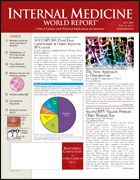Statin Therapy also Reduces Prostate Cancer Incidence
Effect Not Seen with Other Lipid-Lowering Drugs
By John Schieszer
Teemu Murtola, MD
ANAHEIM, Calif—A dose-dependent reduction in prostate cancer has been found among users of statins, but not among users of other cholesterol-lowering medications, according to data presented at the American Urological Association annual meeting.
The investigators found a decreased incidence of prostate cancer for all categories of prostate tumor graded. Use of nonstatin lipid-lowering drugs did not affect prostate cancer incidence, stage, or grade.
This first-ever study to evaluate prostate cancer incidence and serum prostate-specific antigen (PSA) levels among statin users in a completely screened population included 78,484 Finnish men (aged 55-67 years) from a population registry. Some 30,196 were randomly assigned to the screening arm of the trial. Three screening rounds were started during the study period (1996-2004). Each man was screened with a PSA test at least once.
Detailed information on medication use was obtained from a national prescription database. A total of 6755 men had used statins, and 934 men had used other types of cholesterol-lowering medications (ie, fibrates or resins).
Analysis showed that serum PSA was lower among users of any cholesterol-lowering drug compared with no cholesterol medication use.
A dose-dependent reduction in prostate cancer risk was seen among statin users but not among users of other cholesterol medications. The greatest decrease was observed for cancer stage T3 and a sum Gleason score of 5 to 6.
"These findings need to be made known to men who require statin medications for hypercholesterolemia or cardiovascular disease. [They] may be further motivation to these men to use their therapy as prescribed," said coinvestigator Teemu Murtola, MD, clinical researcher at the University of Tampere, Finland.
Another study presented at the meeting reported a reduction in PSA values among healthy men who use statins. The reduction appeared to be most pronounced among men with the largest declines in low-density lipoprotein cholesterol (LDL-C) levels.
This study included 1214 men (mean age, 60 years) who were prescribed a statin between 1990 and 2006 at the Durham VA Medical Center, North Carolina. Median prestatin PSA value was 0.9 ng/mL, and mean prestatin LDL-C level was 144 mg/dL.
All the men were free of prostate cancer, and none had undergone prostate surgery or taken medications known to alter hormone levels. Men with PSA levels ≥10 ng/mL before statin therapy were excluded.
Statins lowered PSA values in a dose-dependent manner, which was proportional to the amount of cholesterol lowering.
The median decline in LDL-C level was 27.5%, and the median decline in PSA level was 4.1% with statin therapy. For every 10% decline in LDL-C level, PSA level declined by 1.6% (adjusted for age).
Experts are debating whether statins affect the risk of prostate cancer. These Duke University investigators hypothesize that statin medications could lower PSA values in healthy men and thus mask prostate cancer. If this turns out to be the case, it could help explain some of the conflicting epidemiologic observations about the association between statins and prostate cancer risk.
